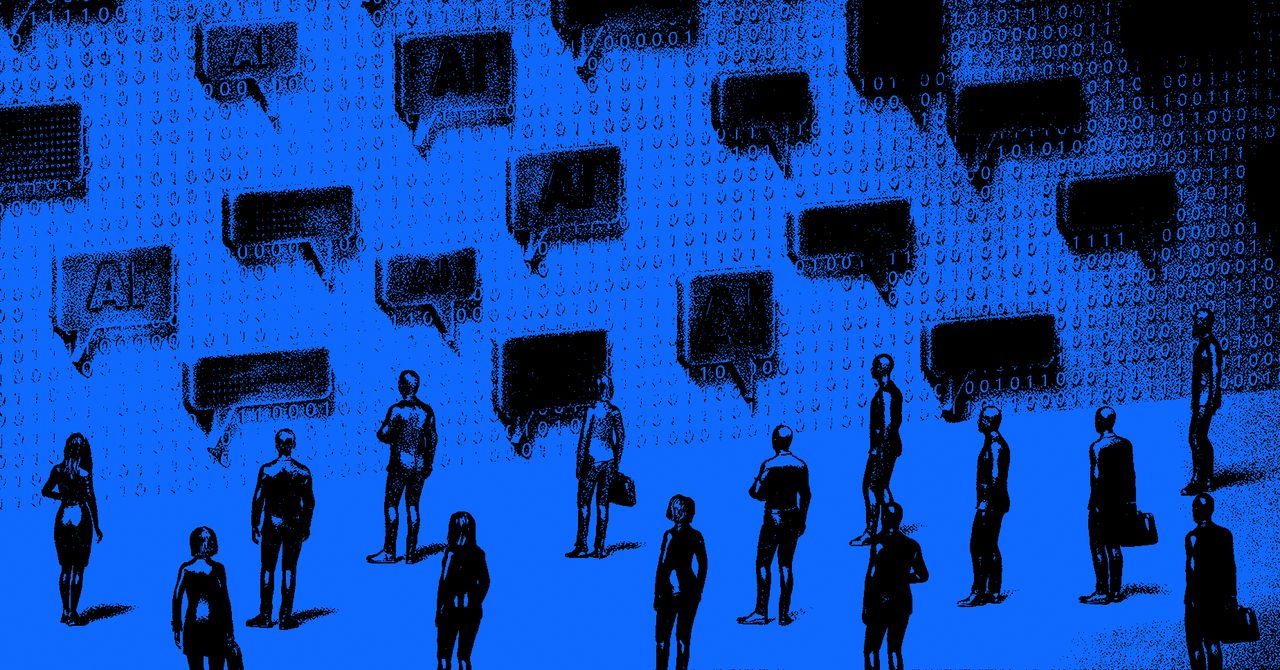I tried to get out of this assignment so many times, in so many different ways.
Not every package needs an editor’s letter, I told them. I was very busy recording a new podcast, getting ready to speak at a tech conference, eating and sleeping, parenting, doodling, revising my to-do list, retying my shoelaces. I was doing my best, I tried to convey to my editor. To be fair, my method of communication was subtle; I simply stopped responding to his emails, imagining that I could exist on a spectral plane where AI wasn’t being shoved down my throat every minute of every day.
Like so many men before him, he wasn’t getting it. “Don’t think of it as an editor’s letter,” he wrote. “Think of it as a short article for the AI package! I know you aren’t interested in WIRED having an AI manifesto.”
He’s right. I’m not. Here’s why: In July 2023, when I was interviewing for this job, every single person involved in the process asked me how I would cover AI. Since then, I have been inundated—fully drowning, water rushing into the nostrils and flooding the lungs—with inquiries about my point of view on the technology. Comms and PR professionals would like to know. The organizer of every major conference happening everywhere on planet Earth is curious. My dad has questions. So does David Remnick. Every other journalist has inquired as well, which is yet another reason on the very long list of reasons I can’t go to any industry parties, now or ever. My neighbor? Wonders about the AI apocalypse. My dermatologist? Has a new AI diagnostic tool she’d love my two cents on. My dogs? GPT-curious.
Thankfully, there are living creatures who don’t want my opinion on AI. My husband is too busy creating AI-generated movies on his phone to care what his wife, who is constantly yelling at him to get off his phone, thinks about AI in the context of her job. And the employees at WIRED, thank God, implicitly understand the same thing about AI that I do: The technology has been around and iterating and evolving for decades; this particular moment of AI fanaticism specifically refers to the deep-learning approach of training AI models on huge reams of data. Yes, it might seem technically intimidating. But it is, truly, not that profound. Unless you’re mainlining the intoxicating stream of hype being spewed by visionary tech marketers like Sam Altman and Dario Amodei, in which case why are you even reading this? Get to the bunker!
The fact is, AI is not a new invention. It is not a mythical solver of all problems or the great destroyer of worlds (and jobs) that we’ve been warned about. It is incredibly expensive and resource-extractive to train, to deploy, and to commercialize, and then to lather-rinse-repeat with more data, new models, more promises, new warnings, and so on, forever and ever amen until we all flip out about quantum in a few years. Generative AI is genuinely useful in some contexts, profoundly useless in others, and decidedly unproven in most. It is situationally dependent. It is not a monolith. A growing number of signs indicate it is an economic bubble. That bubble bursting might be temporarily catastrophic; fascinating and consequential facets of AI technology will exist and continue to shape certain parts of our lives after it does. There is a “there there,” in there. But let’s stop trying to make it a thing with email. We should all just write our own emails. Yes, this is the “take” you’ve all been waiting for.
As for journalism? Is generative AI poised to demolish our industry, desecrating the craft of human-led news-gathering and storytelling? That depends on who you ask. If you ask Google, they’ll assure you that sending traffic and revenue to publishers in the interest of disseminating accurate information has never been more important. Then they’ll introduce AI-infused features to the great detriment of their search product and the publications they’ve ensnared in a decades-long abusive relationship. At this point for publishers, escaping from Google means either taking a major haircut or shutting down entirely. Meta and Mark Zuckerberg have a different take. After pulling rug after rug out from under the news business in recent years, financially bludgeoning publishers around the world and turning Facebook into a Shrimp Jesus convention for your Republican aunts and Threads into an apolitical social media network I haven’t thought about in a year, the company created a “feed of expressive AI-generated videos from artists and creators.” So slop, basically. Total shit, pretty much. And it can’t even do that half as well as OpenAI’s Sora does.
At WIRED, we will use AI sometimes. In the years to come, AI might help us do some copyediting. Already, we use it for (carefully fact-checked) research and brainstorming with the automated equivalent of a fairly stupid intern. Of course, machine learning technology that predates this moment has always been useful for investigative reporting. But unearthing and communicating new and newsworthy information? Landing on the turn of phrase that says exactly what you want, so damn beautifully? The illustration that just makes you want to ~*chef’s kiss*~ in a team meeting, because you can’t wait until the issue goes to print and the world (at least the world of people who still subscribe to print) sees what you do? That’s human work, by humans and for them. Using technology to augment that work, where it makes sense, and avoiding it where it doesn’t. That’s what we do, and it’s what we’ll keep doing.
My advice to WIRED readers is to keep an open mind. You should learn about AI in this moment, and learn how to use some of the tools you keep hearing about. Get the basics, and expand from there if you find it interesting or useful. Whatever you do, don’t become friends with AI or have cybersex with it. For the love of God, we all have enough problems already. Make sure your kids still have human teachers. And then please relax. The world is always changing; technology didn’t begin with ChatGPT. The worst thing about AI might be the fact that we can’t stop talking about it.
I could go on, but I do actually need to run. As I said: Every package doesn’t need an editor’s letter, and I have a mole on my back that I need a human opinion on.



